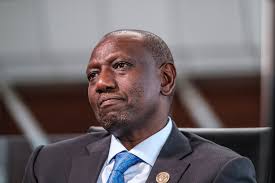Roadside vendor and mother-of-five Christine Naswa bemoaned the state of the Kenyan economy as she hawked vegetables by one of Nairobi’s busiest thoroughfares.
“The economy is very poor right now. There is no money in Kenya,” Naswa, 40, told AFP as the smell of sliced ginger she was hawking powered through bus fumes.
“I do not manage to even feed my children, the costs of living are high, and my profit is low. There are some days when I do not get anything,” she said.
The East African nation is an economic bright spot in a troubled region, but it still faces huge challenges and is coming off a difficult year.
Roughly 40 per cent of Kenyans live in poverty, and are increasingly fed up with soaring living costs, a limited job market and depressingly regular corruption scandals.
The discontent exploded into deadly protests in June last year, with new taxes in President William Ruto’s finance bill the catalyst.
Although some of the taxes were cancelled, many Kenyans are struggling more than ever.
Kenya has a diverse economy including strong agriculture, services and tourism sectors.
But leaping middle-income status requires investment, and like many African nations, Kenya is heavily in debt to foreign lenders, paying more in interest on those borrowings than it does on health and education.
Meanwhile, Kenyans have made it clear that taxes are already too high, with much of the burden falling on the tiny formal sector, which accounts for less than 20 per cent of jobs.
“This year has been the toughest of all our 36-year history” in business, said a shopkeeper in Nairobi’s commercial district, who was afraid to give his name because his store was looted during the protests.
“As soon as the new government got elected, within the first few months, they just started increasing taxes,” he said, adding that he had seen no benefits.
– ‘Distrust and disillusionment’ –
Ruto has squandered the goodwill he enjoyed upon taking office in 2022, say analysts.
“There’s a huge amount of distrust and disillusionment with Ruto’s administration,” said Patricia Rodrigues, of global consultancy Control Risks.
“He came to power promising so much — a better life for the ordinary citizen — and instead… decided to increase taxes, and that was felt as a huge betrayal,” she told AFP.
International bodies like the IMF say Kenya has no choice but to boost taxes to meet the expanding needs of its 55 million citizens.
READ ALSO:Fallen Tanker Explodes On Lagos-Ibadan Expressway
However, the new budget, due to be debated in parliament on Thursday, attempts to avoid any direct taxes that might spark fresh unrest.
“We are at the limit of how much tax Kenyans are willing to bear,” said Kwame Owino, from the Institute for Economic Affairs, a think tank.
“The idea you can raise taxes to cover government inefficiencies and pay for debts that many Kenyans don’t believe were well-used — that idea is gone,” he added.
Some say Kenya’s problems could be solved if serious action were taken against corruption, but Rodrigues said that the problem is “very deeply entrenched.”
Others are already hoping for a fresh start after the elections in 2027.
The shopkeeper, though, was sceptical.
“Kenyans will always elect thieves,” he said. AFP













